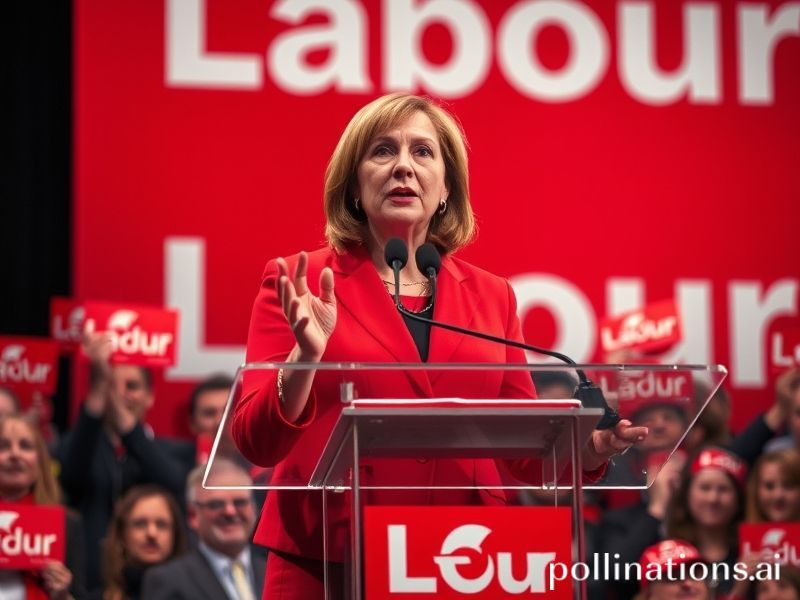Angela Rayner: Britain’s Global Rebrand or Just Another Fire Sale? The World Watches and Calculates
Angela Rayner and the Great British Rebrand: A Tragedy in Three Acts, with Global Audience Participation
When Angela Rayner strides onto the international stage, the world leans in like a pub full of expats watching the last dart of a tie-break: equal parts hope, dread, and morbid curiosity. As Labour’s deputy leader and self-styled “loud northern lass,” Rayner has become the provisional face of post-Brexit Britain’s attempt to rejoin polite company without actually apologising for anything. The cameras love her; foreign diplomats merely tolerate her. That, dear reader, is the precise emotional temperature of Britain’s soft-power re-launch.
From Brussels to Beijing, Rayner is parsed as a geopolitical mood ring. When she drops a glottal stop on the Today programme, European Commission staffers hear “minimum regulatory alignment”; Silicon Valley VCs hear “cheap UK tech labour”; and Gulf sovereign-wealth funds hear “fire-sale utilities.” The same accent that won her the working-class credibility badge in Bury also functions as a sonic discount coupon abroad. Nothing says “global Britain” quite like a politician who can plausibly threaten both to nationalise your railway and to glass you in the car park afterwards.
Yet the Rayner phenomenon is bigger than one woman with a formidable right hook and a biography that reads like Ken Loach fan fiction. She is the provisional mascot of a broader Western trend: social-democratic parties discovering, with the enthusiasm of a late-night email from a Nigerian prince, that class resentment can be monetised as “authenticity.” Across continents, centre-left movements are auditioning their own Rayners—figures who can sell redistribution without frightening the bond markets. In Australia, it’s the telegenic unionist who owns four investment properties; in Canada, the TikTok-savvy premier who still calls oil workers “brothers.” Same product, regional flavouring.
The stakes are not merely parochial. Britain’s next general election will coincide with a planetary pile-up of crises—AI job carnage, climate reparations, the slow-motion seppuku of American democracy. Should Labour win, Rayner will be tasked with convincing global capital that the UK is still a safe place to park money while simultaneously promising to “smash the class ceiling.” It’s like offering to remodel a house while reassuring the occupants you won’t touch load-bearing walls. International investors are already practising their nervous smiles.
Meanwhile, authoritarian regimes are watching with the glee of kids who’ve discovered the teacher’s chair spins. For Beijing, a Rayner-led Britain is a useful cautionary tale: see what happens when you let the poors near the levers? For Moscow, she’s a bespoke culture-war grenade—one viral clip of Rayner mocking Etonians and RT can splice in a Soviet anthem before you’ve finished your borscht. Even the normally staid Swiss have begun contingency planning: if Labour’s proposed wealth tax causes sterling to wobble, Geneva’s private banks are ready to welcome fleeing oligarchs with the warmth of a fondue pot.
Of course, the cosmic joke is that Rayner herself is no revolutionary; she’s a pragmatist marinated in municipal compromise. Her international signature move is to promise Scandinavian outcomes on American tax rates, a cocktail already sampled by the Greeks (spoiler: ends in IMF structural adjustment). Still, the world claps politely, the way you humour a friend who insists they can still do tequila at forty-five.
And so we arrive at the final act. If Labour forms the next government, Rayner will inherit an inbox that looks like Zeus’s spam folder: floods, strikes, cyber-attacks, and a US president who may or may not believe the UK is a wholly owned subsidiary of Disney. Success will be measured not in utopias delivered, but in catastrophes postponed. Should she manage even that, expect the international press to hail her as “the woman who made socialism safe for hedge funds,” a compliment roughly equivalent to being called “the least flammable clown at the bonfire.”
The curtain falls. The audience—battered, bemused, but still inexplicably hopeful—files out into a night that feels distinctly pre-apocalyptic. Somewhere a pundit is already drafting the think-piece: “Angela Rayner: Global Icon or Cautionary Tale?” The answer, naturally, is yes.







